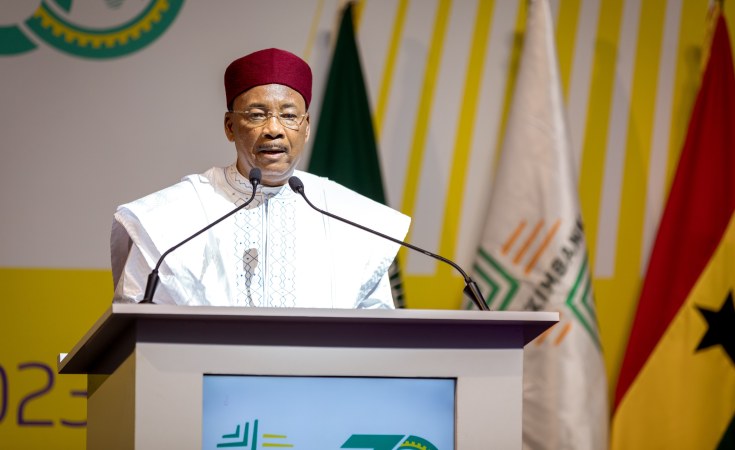The threat of military force to end the coup in Niger has led to significant divisions in the region.
It has heightened tensions in Niger itself, as well as among its neighbours.
There are more and more signs that any military intervention is likely to be met with stiff opposition. Growing support for the junta has emboldened the coup plotters to stay in power and call the bluff of the Economic Community of West African States, Ecowas.
In reaction to the threat of force, more Nigeriens took to the streets to show their opposition, with one protest held close to a French military base in Niamey.
The option of military force has divided countries in west Africa and the Sahel. Ecowas members are fully aware that an all-out war would increase the fragility of the region. A meeting of Ecowas military chiefs in Ghana on 17 and 18 August will discuss intervention options.
Meanwhile, the Ecowas parliament is divided over a military intervention. Member countries such as Nigeria, which currently holds the rotating chair, are also being put under internal pressure. Protesters took to the streets in Kano, the biggest city in northern Nigeria, against a possible invasion of Niger.
For their part, countries that neighbour Niger but do not belong to Ecowas, such as Chad and Algeria, have opposed the use of force.
As a scholar of politics and international relations, I believe that a military intervention in Niger is unlikely, as I have previously stated. However, the threat of force means tensions remain high. This is understandable as a great deal is at stake. I have identified three major implications of a full-blown war.
The first casualty would be the ongoing regional war against terrorism because countries currently committed to this fight would have their armies and resources diverted.
The second is that there would be a mass influx of refugees into the seven countries bordering Niger. This would have a knock-on effect as more refugees seek to find their way to Europe.
The third is that the conflict would heighten tensions between Niger and France. The junta blames France for the country's insecurity and economic woes.
Counting the cost of war
Nigerien soldiers, through the G5-Sahel and Multinational Joint Task Force, are involved in the fight against Boko Haram, Islamic State West Africa Province (ISWAP) and other terrorist groups around the Lake Chad Basin and other regions of the country. An attack led by Ecowas on Niger would distract the soldiers and divert critical resources.
Terrorist groups could then take advantage of borders weakened by conflict. They could also benefit from a situation where armies which previously fought side by side against insurgents such as Boko Haram and ISWAP were now fighting one another.
The example of Syria and how ISIS quickly emerged in the region gives a glimpse of what could happen.
Most of the Nigerien population lives in the southern part of the country next to the borders with Nigeria, Republic of Benin, Burkina Faso and Mali. These countries would suffer an influx of refugees, further destabilising what are already fragile states.
A war between the Nigerien military and Ecowas would embolden human traffickers and lead to more Africans taking advantage of the chaos to travel north towards Europe.
Niger has several bilateral and multilateral arrangements with the European Union and other countries in Europe to curb mass migration through Libya and the Mediterranean sea.
Agadez in central Niger used to be a major hub for illegal migration but this has changed as a result of the concerted effort between Niger and its European allies.
Military intervention would lead to a total collapse of the relationship between France and Niger's people. There is already anger among a large part of the Nigerien public against the former colonial master and its activities in the country.
Niger was a French colony from 1922 till independence in 1960 and Paris has continued to play a critical role in the domestic political and economic affairs of the country.
If people believe that Ecowas is being pushed to take military action by France and its allies, Nigeriens could look to Russia which has issued its own warning against military intervention.
While Russia might not have the capacity and resources to fully mobilise in support of the junta, it might engage the Wagner Group, the Russia-backed private military contractor, which already has a presence in neighbouring Mali.
Russia has been careful not to support the coup plotters so as not to upset its allies in Africa, such as South Africa and Namibia, who both oppose the coup. But a full-scale military intervention would provide Moscow with an opportunity to get involved and "gain another ally". The military leaders in Burkina Faso for instance have been strengthening their relationship with Russia.
Limited options
Ecowas is desperate to "do something" after the junta defied its seven-day ultimatum to step down.
Meanwhile, the junta is not showing any signs of backing down.
I think the best option is to rule out military action and to negotiate a short transition period to restore democracy.
Olayinka Ajala, Senior lecturer in Politics and International Relations, Leeds Beckett University


